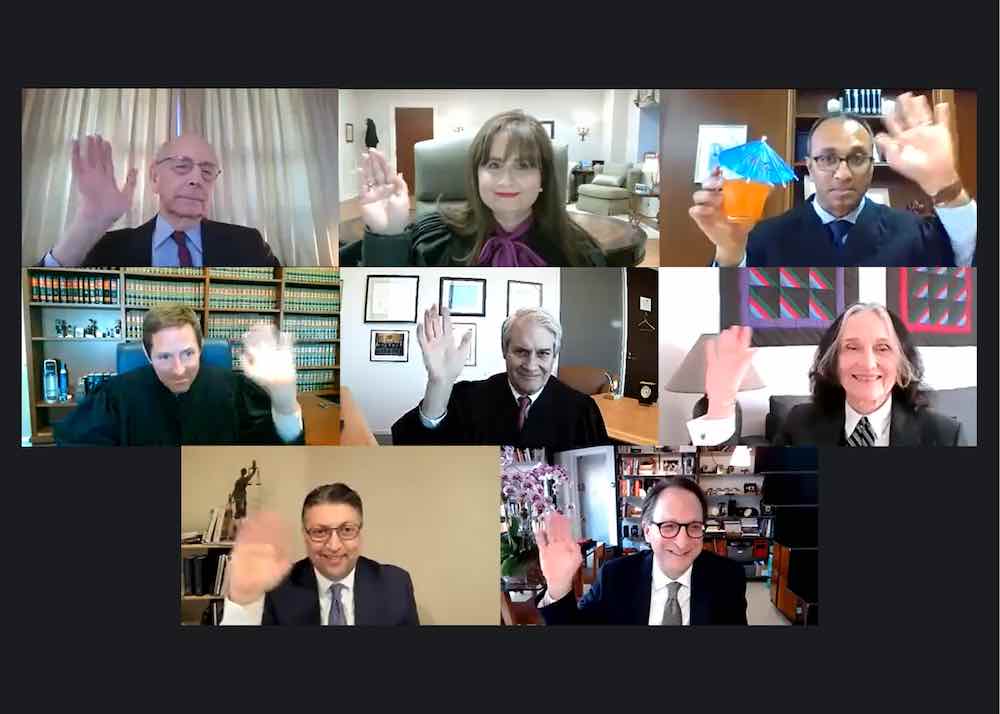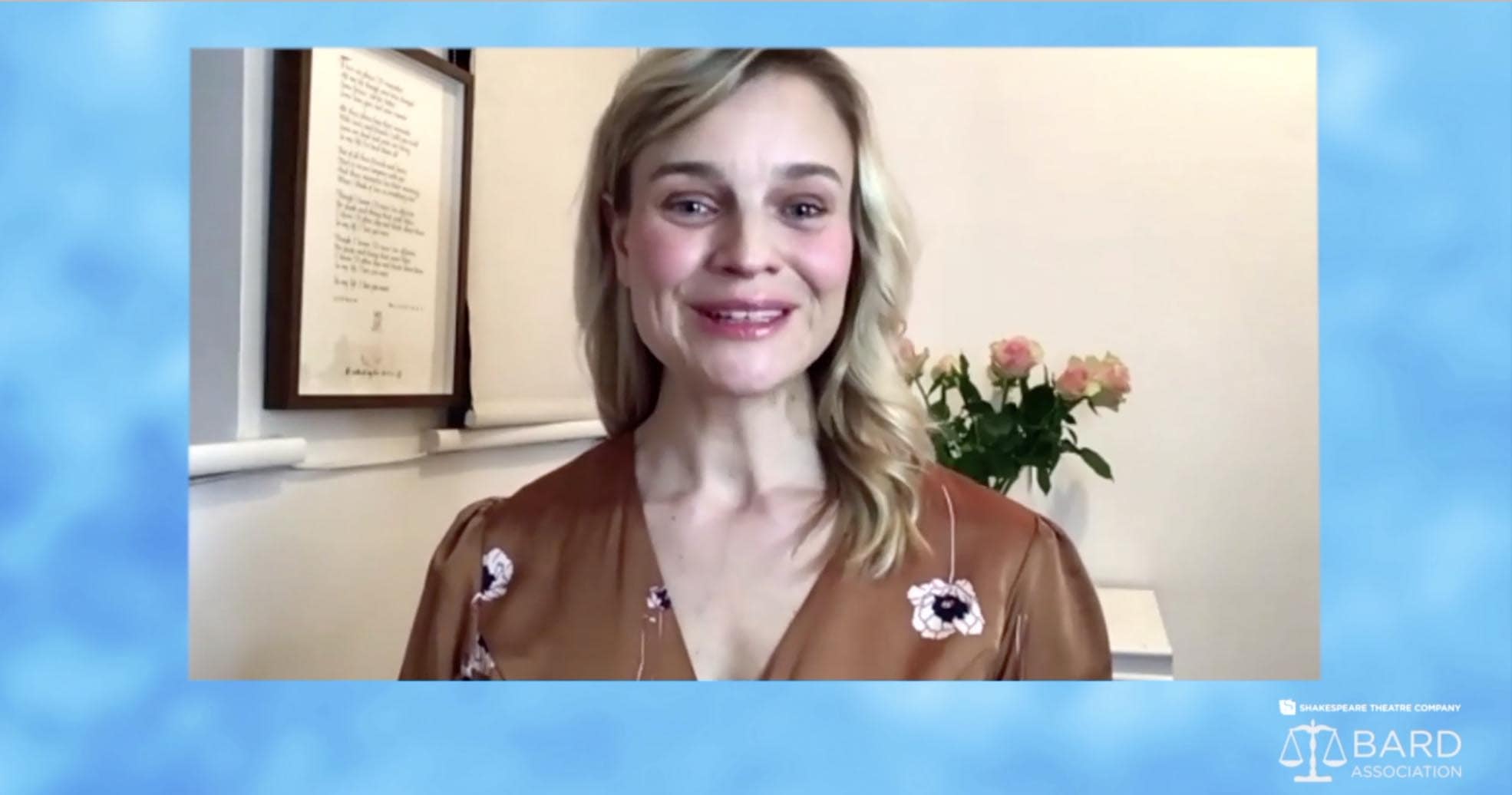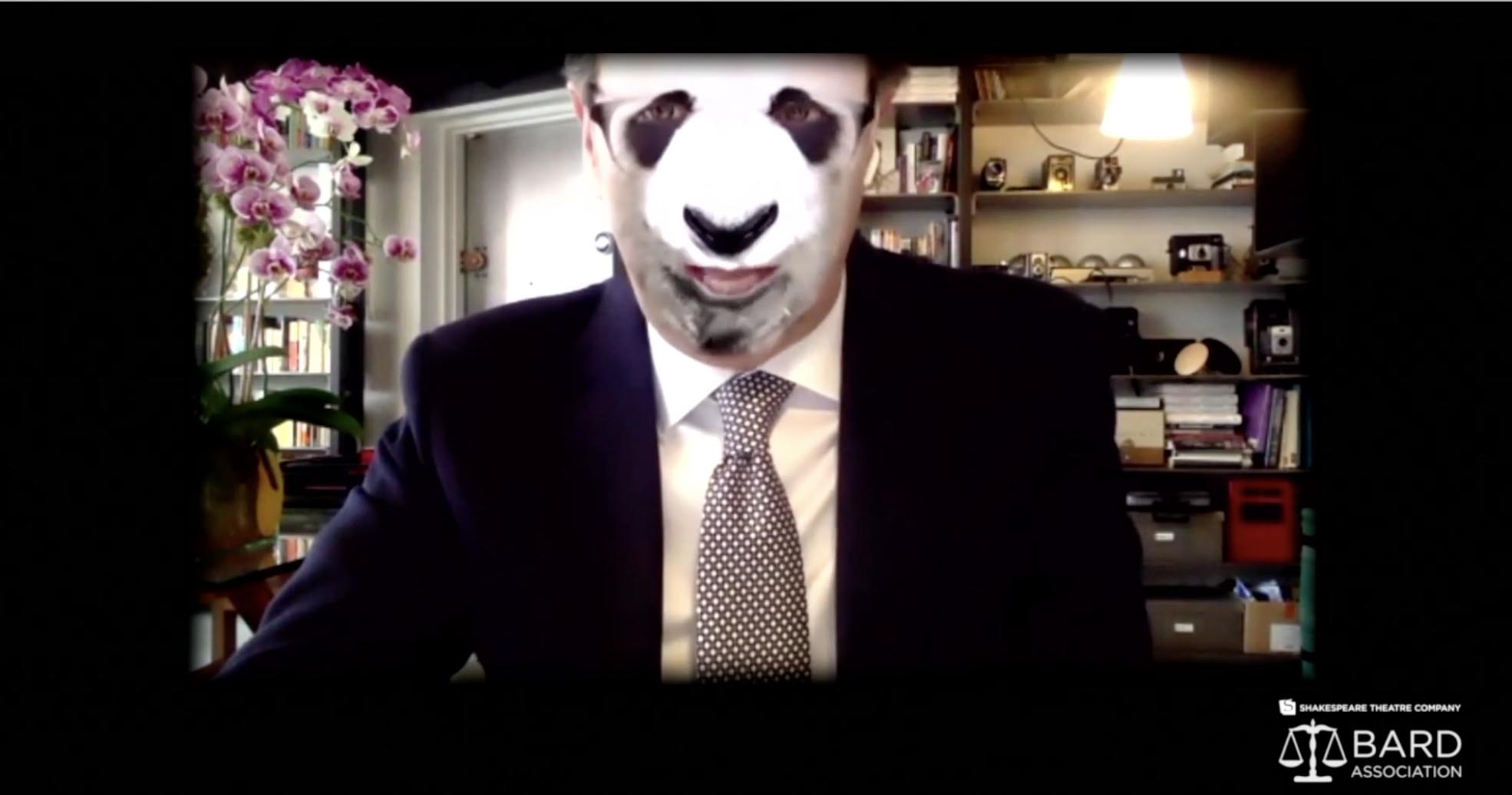Critic Marjorie Garber suggests that A Winter’s Tale is “a hall of mirrors” and that the main character, King Leontes, lives in a solipsistic universe. The beloved tradition of STC’s Mock Trial, which combines the poetic mysteries of classical theater with the aspirational certainties of modern law, is a hilarious and sophisticated thrill ride that brings the themes of Shakespeare’s play into sharp, contemporary focus. Under the guidance of the distinguished Supreme Court Justice Stephen G. Breyer, we are reminded that although it has been a long winter, spring is coming.
The Mock Trial is a highly anticipated event, due to the illustrious roster of legal professionals who participate. U.S. Supreme Court Justices Ruth Bader Ginsburg, Stephen G. Breyer, Samuel Anthony Alito Jr., Sonia Sotomayor, Elena Kagan, and Brett M. Kavanaugh (then of the United States Court of Appeals for the D.C. Circuit) have all presided.

Other well-known judges include the Honourable Suzanne Côté from the Supreme Court of Canada, as well as Judge David S. Tatel, Judge Thomas B. Griffith, Judge Patricia A. Millett, Judge Cornelia T.L. Pillard, Judge Robert L. Wilkins, Judge Douglas H. Ginsburg of the United States Court of Appeals for the D.C. Circuit, and Chief Judge Merrick Garland, now Attorney General of the United States.
The trial itself is sponsored by The Shakespeare Theatre Company’s Bard Association, which offers lawyers and other individuals with legal ties the opportunity to experience the glories of classical theater.
Hannah Yelland, who played Queen Hermione in STC’s 2013 Winter’s Tale, begins with some lovely lines from the play, inspiring me (and I’m sure many others) to wish they had seen her performance. The graceful introduction is by Moderators Yelland and prominent attorney Abbe David Lowell (Winston & Strawn LLP), who is also Vice Chair of the STC Board of Trustees and Chair of the STC Bard Association.

The play is justly famous for the truly mind-blowing, sometimes seemingly LSD-inspired rages of the abrasive King Leontes. Falsely believing that his wife Queen Hermione is betraying him with his best friend King Polixenes, he imprisons his pregnant wife and mandates the killing of her alleged lover. He then orders the murder of Hermione’s daughter Perdita, once she is born, believing that the girl was sired by Polixenes. Paulina tells Leontes that his wife Hermione is dead. The King, in a breathtakingly strange turn of events, displays remorse.
Polixenes is warned and flees back to his own kingdom, accompanied by Paulina’s husband, Antigonus. Antigonus leaves baby Perdita on a hillside, because Leontes, in a rare moment of slightly less horrifying vindictiveness, has commuted her sentence. In perhaps Shakespeare’s most difficult-to-execute stage direction, Antigonus “[E]xit[s], pursued by a bear” and is eaten.
After 16 years—in the Mock Trial scenario—Hermione and Leontes are reunited. Despite the couple’s slightly rocky relationship, they have sued Paulina for intentional infliction of emotional distress, for keeping them apart.
Amazingly, the jury found in Leontes and Hemione’s favor and awarded them 10,000 florin. Paulina appealed, and the appellate court affirmed the verdict and judgment. Paulina then petitioned for Supreme Court review and the Court agreed to resolve the following questions:
- Should the emotional distress claim have been dismissed because Paulina’s speech and actions involved matters of public concern shielded by the constitutional guarantee of freedom of speech?
- And did Paulina intentionally inflict emotional distress on Leontes and Hermione under the “actual malice” standard required in the law, where Hermione had willingly agreed to remain in seclusion and Leontes’s distress was caused by his own tyrannical conduct, and not Paulina’s behavior?
Divine madness enters, in the form of Andrew Weissmann, Jenner & Block LLP, NYU School of Law, Former General Counsel of the Federal Bureau of Investigation, and Counsel for the Petitioner, Paulina. Wearing a bear mask, he declares, “I am actually a bear. I’m not a lawyer. I’m the bear that ate Antigonus as a result of Leontes’ actions.” In the brief, Weissmann tells us that Paulina was attempting to save the state from the “mad king” who was “very stable” and believed Paulina was a “nasty woman” and “not even his type.”

Besides, Weissmann alleges, “52 percent of Sicilia believed Leontes was irrational.” Or, as I like to call him, “The Former Guy” (“TFG”). TFG, aka Leontes, among other things, ordered his wife Hermione burned at the stake, imprisoned her while pregnant, and caused the baby, Perdita, to be abandoned in “some remote and s***hole place,” an act akin to, if not actually much worse than, that of a certain Senator who left poor Snowflake back in Houston.
Judge Griffith sought clarification of the role of the bear. Possibly, he opined, Paulina was a member of the deep state, colluding with her husband (and the bear) to undermine Leontes’s rule. Weissmann countered that this was as likely as the existence of “Jewish lasers.” Judge Deahl speculated that perhaps Hermione was secluded in tunnels under the pizza shop in DC that was featured in Pizza Gate. Judge Mehta raised a glass—a cocktail with a paper parasol. He was, he explained, anxious to get to Cancún.
Weissmann defended Paulina’s actions by citing her fealty to the vision of the Oracle, who had found Hermione and Polixenes blameless, a judgment TFG had deemed “fake.” Justice Breyer posed a question: “What if a man is accused of assault, and he says his dog made him do it? How is that different?” Later Judge Deahl interjected that Polixenes was once known as “Key Party Poli” (I had to look this up), although this nickname was unconfirmed.
Judge Griffith objected to Weissmann’s use of a foreign legal argument. Weissmann asserted that the King was no stranger to suing for emotional distress, having, as noted in the brief, sued a Miss Sicilia for claiming the contest was rigged, the Sicilia Tribune for doubting his wealth, and Four Seasons Leeching and Necromancy for having a confusing name. All our citations, he assured the court, were from Sicilia, unlike those of his opponents who quoted cases from the, ahem, colonies.
The highly original, if ill-informed, advocacy of Sidney Powell was referenced by Judge Mehta, who harbored the suspicion that Paulina was an agent of the (now deceased) President of the Dominion of Venezuela, Hugo Chavez. Weissmann mentioned that Powell had written a brief in coordination with the Jester Rudolfo, no doubt enhancing the argument’s credibility.
Makan Delrahim, Counsel for the Respondent, emphasized the King’s undying love for his wife, and the crushing heartbreak caused by the years of separation. Judge Griffith, injecting a note of faux realism, mentioned that he could not understand the reconciliation. After all, the Queen had slapped Leontes’s hand away. And she did wear that jacket indicating, “I Really Don’t Care, Do U?”
Judge Deahl brought up the two Kings’ high school yearbook, in which Leontes was referred to as a “Hermione alumnus” and the term “Devil’s Triangle” was remarked upon, the meaning of which remains in dispute.
Judge Delrahim acknowledged that in those days Leontes was a “free spirit” and that at the time the Protestant Church was attempting to rid the God-fearing Christian world of a scourge of devil worshippers.
Justice Breyer asked, “Where are the damages?” He reminded us that although the play begins in a wintry, bleak kingdom, in the end spring does come, despite the many years of heartache. He quoted, with a smile, Hermione’s line “It is required that you awake your faith spring has come.”
TFG was not known for his remorse, and his wife was not known for her graciousness. In that sense they do not resemble Leontes and Hermione. But with the happy ending the play rejoices in, perhaps we can visualize the coming of a new, hopeful America. Spring is indeed coming. And, with luck, one day it will be here.
A Winter’s Tale of Marital Woe: Who’s to Blame?—the winter 2021 Virtual Mock Trial at the Shakespeare Theatre Company—premiered March 11, 2021, and is available for encore viewing until Sunday, April 11, 2021. Tickets, which are $20 and good for 72 hours, are available online. Tickets are free for current students; call the Box Office at 202.547.1122 Monday–Thursday, Noon–6 p.m to reserve.
Bench
Justice Stephen G. Breyer, Supreme Court of the United States, presiding
Judge Jennifer Walker Elrod, United States Court of Appeals for the Fifth Circuit
Judge Amit P. Mehta, United States District Court for the District of Columbia
Judge Joshua Deahl, District of Columbia Court of Appeals
Judge Thomas B. Griffith, United States Court of Appeals for the District of Columbia Circuit (ret.)
Advocates
Makan Delrahim, University of Pennsylvania Carey Law School, Former Assistant Attorney General for the Antitrust Division of the United States Department of Justice
Andrew Weissmann, Jenner & Block LLP, NYU School of Law, Former General Counsel of the Federal Bureau of Investigation
Moderators
Abbe David Lowell, Winston & Strawn LLP
Hannah Yelland, Actress, STC’s The Winter’s Tale
Mock Trial Scenario Committee
Abbe D. Lowell, Chair, Winston & Strawn LLP
Jerry Block, Venable LLP (retired partner)
Carol Elder Bruce, Law Office of Carol Elder Bruce, PLLC
Gregory Cooke
Nina Laserson Dunn Esq.
Burton Fishman, Fortney & Scott LLC
Michael Kades, Washington Center for Equitable Growth
Lloyd Randolph
John Vogel, Crowell & Moring LLP
Carolyn Wheeler, Katz, Marshall & Banks LLP
The Shakespeare Theatre Company Bard Association is generously supported by Eversheds Sutherland LLP. The 2020/21 Season Streaming Sponsor is the CoStar Group.
RELATED: Washington wonks and Bard buffs to meet in mock trial




